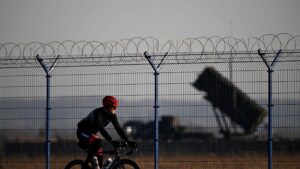Ukraine has named the unarmed prisoner of war who appeared to have been shot dead by Russian soldiers, as Volodymyr Zelenskiy delivered an overnight message resolving to “find the murderers”.
In the graphic 12-second clip that first circulated on Telegram on Monday and was widely shared on Twitter, a detained combatant, named by the Ukrainian military as Tymofiy Mykolayovych Shadura, is seen standing in a shallow trench smoking a cigarette. The soldier, in uniform with a Ukrainian flag insignia on his arm, says: “Glory to Ukraine,” and is then apparently shot with automatic weapons.
He slumps to the ground as bullets appear to hit his body and a voice is heard saying: “Die, bitch” in Russian.
The Ukrainian military said in a statement that Shadura was a member of the 30th Separate Mechanized Brigade and had been missing since 3 February near Bakhmut in eastern Ukraine.
“Currently, the body of our serviceman is in the temporarily occupied territory. The final confirmation of the identity can be established after the return of the body and the relevant examinations.
“The command of the 30th Separate Mechanized Brigade and the brothers of the hero express their sincere condolences to his relatives and friends. Revenge for our hero will be inevitable. Glory to Ukraine! Glory to heroes!”
Zelenskiy had earlier condemned the alleged killing by posting a video message on his Instagram and Telegram account late on Monday evening.
“Today, a video has emerged of the occupiers brutally killing a warrior who bravely said to their faces: ‘Glory to Ukraine!’, he said. I want us all to respond to his words together, in unity: ‘Glory to the hero! Glory to the heroes! Glory to Ukraine!’ And we will find the murderers. Ukraine will not forget the feat of each and every one whose lives gave freedom to Ukraine for ever.”
Andriy Kostin, Ukraine’s prosecutor general, said on Telegram that Ukraine’s security service had registered the shooting as a criminal case under part of the country’s criminal code that covers violations of war laws and customs.
“Even the war has its own laws,” he said, adding that prosecutors from his office would lead the case. “There are rules of international law systematically ignored by the Russian criminal regime. But sooner or later, there will be punishment.”
The Guardian could not independently verify the authenticity, date or location of the video.
Ukrainian and foreign media as well as bloggers had been trying to find the identity of the Ukrainian soldier. More than six different names were claimed on various social media.
The head of Ukraine’s presidential office, Andriy Yermak, said the man was a Ukrainian prisoner of war and the incident was part of a “deliberate policy of terror” by Russia.
“The murder of a captive is the latest Russian war crime,” Yermak tweeted. “For every such war crime there will be retribution.”
Kyiv has previously accused Moscow of torturing and killing prisoners since Russia invaded Ukraine.
In July, a video emerged that appeared to show a Russian soldier castrating and subsequently killing a Ukrainian prisoner. The UN human rights monitoring mission at the time said it was appalled by the footage.
Last month, Konstantin Yefremov, a senior Russian lieutenant who fled after serving in Ukraine, described to the Guardian how his country’s troops tortured prisoners of war and threatened some with rape.
Throughout the war, the Kremlin has accused Ukrainian soldiers of executing Russian PoWs and the west of ignoring the incidents.
Ukraine’s foreign minister, Dmytro Kuleba, said the “horrific” video was more “proof this war is genocidal”.
Kuleba added it was “imperative” that the international criminal court prosecutor, Karim Khan, “launches an immediate ICC investigation into this heinous war crime”.
“Perpetrators must face justice,” he said.
Ukraine’s human rights commissioner, Dmytro Lubinets, said he had sent the video to the country’s “international partners”.
“Once again, they violate Geneva conventions. They will not evade responsibility for their atrocities,” Lubinets wrote.
Additional reporting by Artem Mazhulin





